
Atelier Ayesha: The Alchemist of Dusk Review
"Awww! That's soooo cute!" – Another day in the life of Atelier Ayesha: The Alchemist of Dusk'sconfused and uninspired world.
Thinly glued together by shards of almost-compelling gameplay and frequently insignificant story events, this Japanese RPG takes its first steps in delivering a charming slice-of-life, peppered with potentially addictive, deep game mechanics. But rather than mine the lucrative pleasures of the JRPG genre, rich with its detailed environments, expansive dungeons and gripping pace, Atelier Ayeshafocuses the majority of its efforts on cute girls and short dresses.
Beneath the painful layers of high-pitched clichés lies a much more promising proposition. The game's addictive crafting system, quick-fire battles, and technically beautiful character models, trickle their way through the cracks and leave behind the seeds of a cheerful, carefree experience.
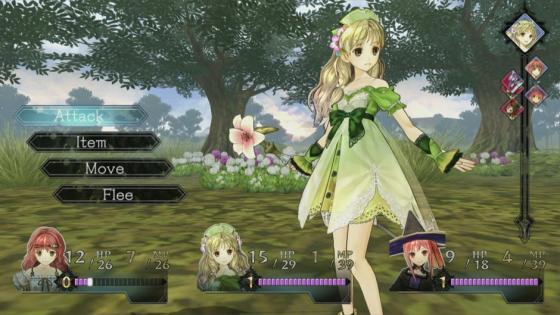
At the heart of the adventure's warm fuzziness is Ayesha, a practicing apothecary, seemingly unaware of her extraordinary abilities to reshape materials and mix ingredients into far more powerful tools. Her shy and whimsical nature fulfils the expectations of anybody who has sat through an anime or two, but Ayesha's smarter than she lets on. She just needs a kick!
Sadly, the harsh boot of JRPG storytelling has delegated the fate of Ayesha's sister to a carrot dangling vanishing act. The mysterious disappearance of Nio has been a fact of Ayesha's life for some time now, but it is only when the brooding trench coat of Keithgriff Hazeldine steps in that she decides to embrace her potential as an Alchemist. Vague hints from this wise old man give Ayesha the jump start she needs to investigate the oddities surrounding her sister's disappearance and travel beyond the confines of her small hut.
While this is hardly the grand premise you'd find in the likes of Final Fantasy XIII or Ni no Kuni: Wrath of the White Witch, it isn't supposed to be. In place of a high concept, save the world epic, Atelier Ayesha portals the player into a three year segment of Ayesha's life. Gathering herbs, mixing ingredients, making friends and honouring your medicine deliveries are major parts of the experience, with turn-based battles picking up the slack should you need a change of pace.
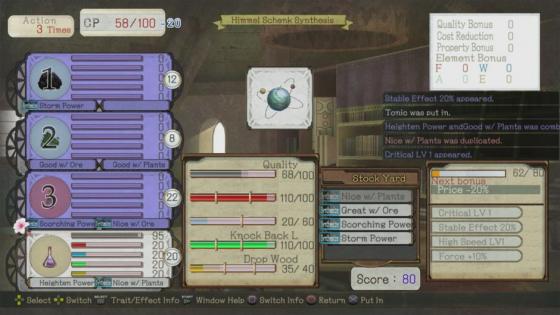
Strangely, the amount of time you'll get to spend on these activities is limited by the game's time management system. You have three in-game years at your disposal, allowing you to do anything you like within the time frame. And while the clock does not act as a relentlessly ticking timer urging you to press on with a no-dawdling policy, the sheer existence of this system is confusing.
Moving from town to town, engaging in battles, gathering alchemic ingredients and rushing to any of the date specific contests all take up a certain amount days, weeks or months on the calendar. You are given plenty of leeway to explore and craft items to your heart's content before the three year limit runs out, but a finite calendar in an experience that thrives on its exploration and carefree nature feels conflicting and unnecessary, serving only as a constant reminder that you are on a leash—albeit a long one.
An argument can be made that such damning certainty immerses players, but this sentiment is squashed the moment Ayesha bends down for a few seconds to gather materials, only for an entire day to pass in the process.
The feeling of immersion is more prominent when dealing with the evolution of the game world and its growing communities. Characters have their own storylines and events in accordance with the calendar, and contests and unique shopping opportunities are also affected by the date and time of the in-game clock. It's just a pity that an element of the game's completion is somewhat out of your control, adding zero value to the enjoyment on the whole.
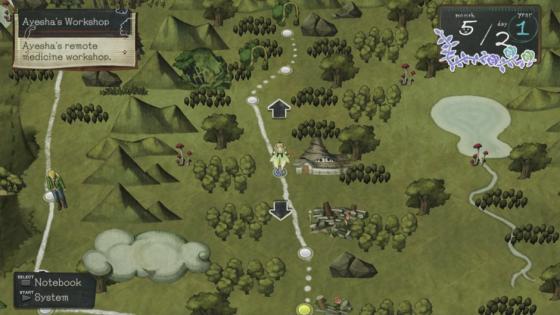
The world map is the central hub for the game's fun factor and this is the last place you would want any sort of constraints. Nevertheless, what's there is more than enough to sink your teeth into.
New areas are frequently being discovered in the early stages of the game, allowing you to open up further locations upon clearing every last monster on the field and gathering all its materials. Tedium has a habit of setting in if you plan on chasing after every point of interest, but thanks to the game's speedy turn-based battle system, most combat encounters are pleasurable bumps in the road.
The three members of your party all work together, complementing the strengths of one another and mitigating any damages headed their way. Who you choose to accompany Aeysha in battle is largely up to you, with extra characters being revealed according to your individual path throughout the journey. The focus on character relationships is consistent within combat due to some of Atelier Ayesha's more unique features.
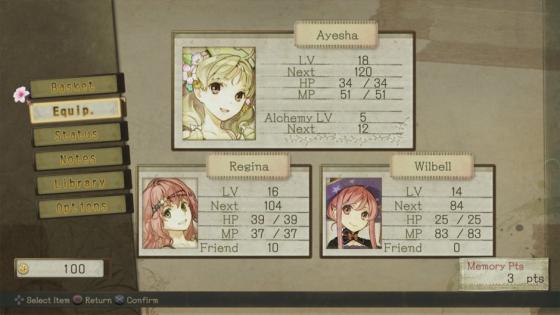
By being on the receiving end of an enemy attack, or perhaps dishing out some of the pain yourself, the Active Command (AC) gauge of your character fills up. Depending on the current level of their AC gauge, team-mates are able to use a portion of the meter to chain pursuit attacks one after the other, deliver a devastating super move, or jump in to take the hit for a friend. Any action using the AC gauge can be activated during another member's turn, giving way to a barrage of instantly gratifying combos in an otherwise traditional turn based battle system.
The stiff animations and dull presentation found in the in-game cutscenes—many of which lack any voices—are all but gone in the heat of battle. Linca's impressive jump attacks and Regina's grenade-throwing acrobatics are all on show. Yet they are not the only fighters with a strong set of skills. No matter whose flashy performances you decide to bring along, the game fully accommodates your choices.
Atelier Ayesha frees you from the shackles of a linear narrative, with no character feeling more important than the other. You choose to pursue the stories of your favourites, safe in the knowledge that you aren't gimping yourself by taking a shine to the "weakest" members of the cast.
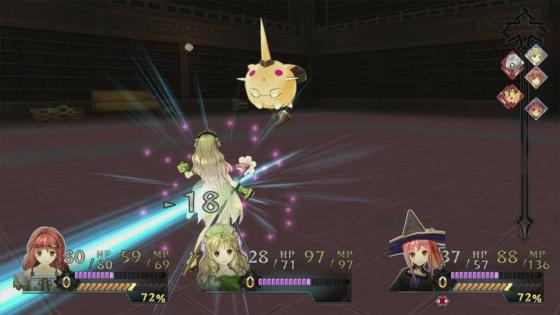
If only all aspects of the game were handled with such care. The fancy fires lit during combat are a stark contrast to what can be found everywhere else.
It's strange. There is plenty to do in any given town, with the majority of NPCs offering a slew of fetch quests one after the other—despite hassling you for goods in the past—but there is a myriad of immersion-breakers pinching at the skin to wake you up. Maps will often consist of small areas separated by loading screens, the environments are bare, and eerily silent chatter between townspeople leaves the whole experience feeling cold and isolated.
There is an impression that Atelier Ayesha took steps towards creating a fully immersive and ever evolving world, but abandoned this endeavour halfway through, perhaps due to a limited budget or an imminent deadline.
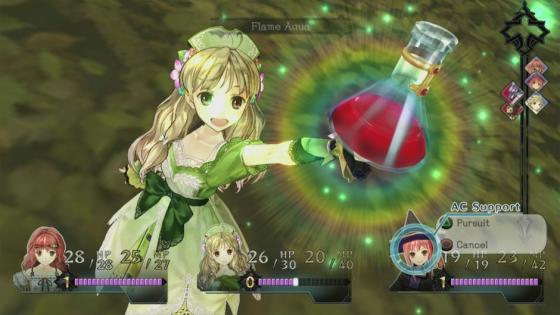
Whatever the reason, the experience offered reminds me of silly decisions I have made in the past.
During the time you convince your friend to sit in a shopping trolley atop a steep hill, there is a point that you question it. The outlook is bleak, and following along this path is sure to end in tears. But as you chase him down the hill, doing your best to catch up to the speeding wheels of the supermarket baggage carrier, the fun and elation that was lacking in your first assessment shines brightly at the forefront.
Atelier Ayesha: The Alchemist of Dusk teased similar emotions from me. The dazzling lights during the game's battles taking the place of a fearful adrenaline rush, with the colourful dresses worn by the young ladies at the Vierzeberg's bazaar mirroring the same shallow excitement inherent to pushing a trolley down a hill. But these short sparks are only enough to sustain the initial bad vibes for a short while. Ultimately, they both end in a bit of a crash.
(He's fine by the way).
Atelier Ayesha: The Alchemist of Dusk (Reviewed on PlayStation 3)
Game is enjoyable, outweighing the issues there may be.
Atelier Ayesha: The Alchemist of Dusk teased similar emotions from me. The dazzling lights during the game's battles taking the place of a fearful adrenaline rush, with the colourful dresses worn by the young ladies at the Vierzeberg's bazaar mirroring the same shallow excitement inherent to pushing a trolley down a hill. But these short sparks are only enough to sustain the initial bad vibes for a short while. Ultimately, they both end in a bit of a crash.











COMMENTS